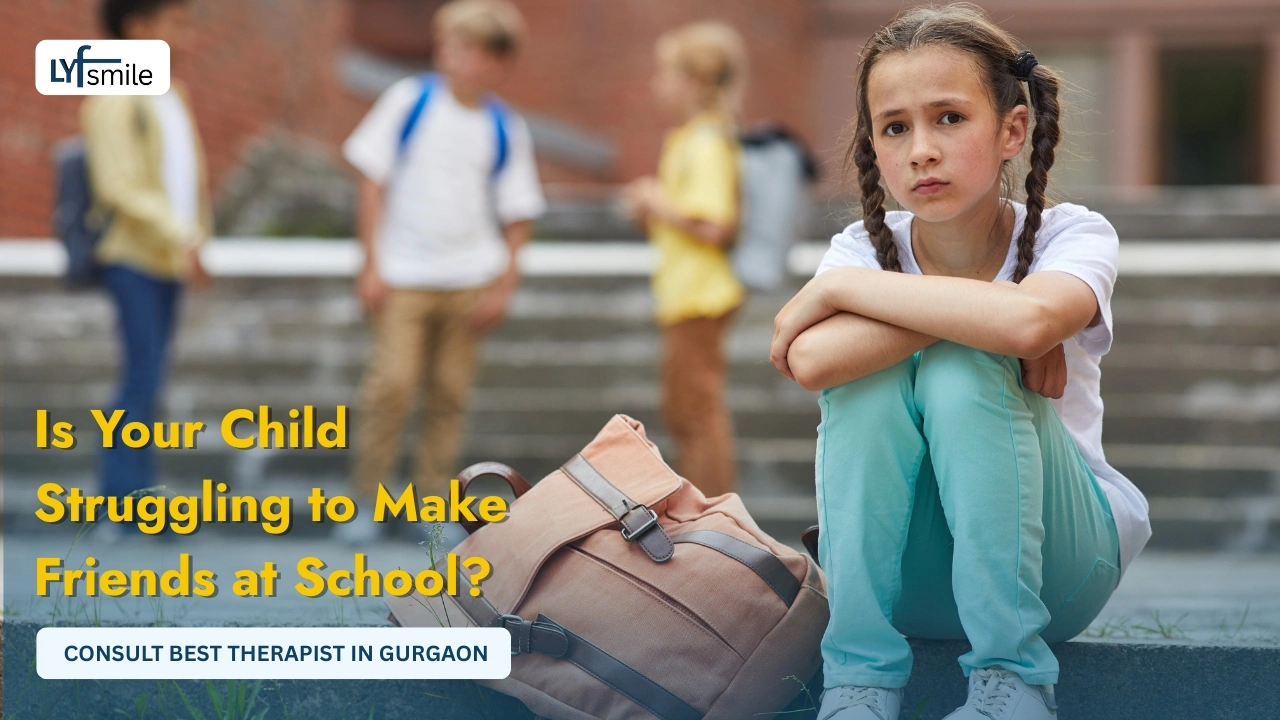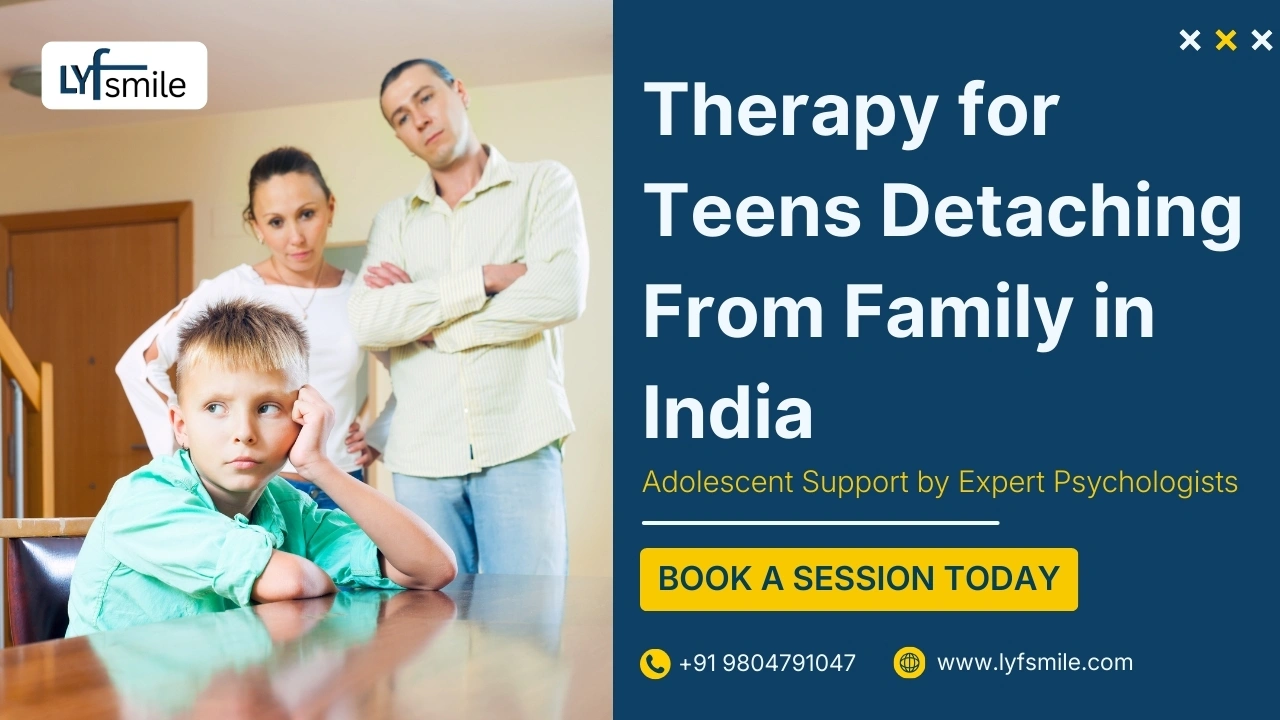
Anupam Tripathi
Is Your Child Struggling to Make Friends at School? Consult Best Therapist in Gurgaon
As parents, we all want our children to laugh, play, and feel included. So, when your child comes home quiet, sits alone during lunch, or says “I have no friends,” it can be heartbreaking and confusing. You may start asking yourself:
Why is my child not like other kids?
Is something wrong socially or emotionally?
Should I worry or will this improve naturally?
The truth is — many children find it difficult to make friends at school, especially when they are shy, anxious, or struggle to express themselves. Some kids want to join others but feel nervous. Others may have experienced rejection or teasing before, making them withdraw even more.
Without friends, school can feel overwhelming. It can affect:
Confidence
Communication
Academic performance
Overall emotional well-being
But here’s the reassuring part — your child can learn to connect with the right support. With professional guidance from a child psychologist in Gurgaon, children can build strong social skills, understand emotions better, and slowly develop friendships they feel proud of.
Is It Common for Children to Have No Friends at School?

It’s not very common. Every child is different — some make friends quickly and enjoy group play, while others take more time to open up and feel comfortable. If your child doesn’t have close friends right now, it doesn’t always mean something is wrong. They might just be learning how to talk, share, and understand others’ feelings.
Some kids are naturally shy and like to watch before joining in. Others might find noisy or crowded places too overwhelming. Sometimes, if a child has been teased, ignored, or left out before, they may be scared to try again. Even simple differences in hobbies or personality can make it harder to connect with classmates.
Friendships don’t always happen overnight — they take time. But if your child often feels lonely, avoids other kids, or seems sad about not having friends, it’s time to pay attention. Making friends is important for their confidence and happiness. With love, support, and sometimes guidance from a child therapist, children can slowly learn how to communicate, feel brave, and build real friendships that make school a happier place.
Why Some Children Struggle to Make Friends
Every child is different — some jump into group play with excitement, while others prefer to observe quietly from the side. Making friends isn’t always easy, and for many children, social interactions can feel confusing, overwhelming, or even scary. If your child takes longer to connect or hesitates to talk to new classmates, it doesn’t mean they lack social skills. It simply means they need more comfort, practice, and guidance to understand how friendships are built.
Here are some reasons children find it difficult to make friends:
1️. Shyness or Social Anxiety
Some children feel nervous approaching others or joining groups.
They want to play, but fear rejection or embarrassment holds them back.
2️. Low Self-Confidence
Kids with self-doubt often think, “What if no one likes me?”
This stops them from taking social steps.
3️. Communication or Speech Challenges
If a child struggles to express themselves or misses social cues,
they may avoid interaction completely.
4️. Different Interests or Personality
A quieter child may feel out of place among loud or highly active kids,
which makes forming friendships more difficult.
5️. Bullying or Past Rejection
Negative experiences can hurt a child’s trust and make them scared to try again.
6️. Emotional Regulation Difficulties
Children who get frustrated, angry, or upset quickly may struggle to maintain friendships.
7️. ADHD (Attention Deficit Hyperactivity Disorder)
Children with ADHD may struggle to focus, wait their turn, or follow social rules — but with support, they can learn to make lasting friendships.
8️. Autism Spectrum Conditions (ASC)
Kids on the autism spectrum may find it hard to read body language or join group play — yet with therapy, they can form strong, meaningful bonds.
Children have unique personalities and emotional needs. With empathy, patience, and professional guidance when required, even the shyest child can learn to communicate confidently and create meaningful friendships at school.
Signs Your Child Is Having Trouble In Socializing
Children may not always express their struggles, but their behaviors often speak louder. If a child feels left out or unsure how to make friends, you might notice small emotional or social changes in their daily life. These signs can show that they are finding it hard to connect with classmates or feel confident in group situations.
Here are some signs:
Prefers playing alone or staying isolated during school or outings
Shows anxiety, hesitation, or tears before school
Rarely gets invited to birthday parties or group activities
Avoids making small talk or starting conversations with other kids
Says things like “Nobody likes me” or “I don’t fit in”
Has difficulty sharing, taking turns, or understanding social boundaries
Feels very attached to one friend and gets upset if that friend is busy
Acts out, becomes overly emotional, or shuts down in group settings
Spends too much time on gadgets instead of interacting socially
Shows low confidence or frustration around peers
If you observe these signs regularly, it’s not something to ignore. Social skills develop over time — but without support, a child may begin to believe they are “not good enough” to have friends. Early intervention helps protect their emotional health and self-esteem. With guidance from a child psychologist in Gurgaon, children can learn how to approach peers confidently, handle social challenges, and build happy, lasting friendships.
How Having No Friends Affects Your Child’s Emotions

When a child feels left out at school, it doesn’t only affect their playtime — it affects their heart. Children who struggle to make friends may start believing they are “not likable” or “not good enough,” even when they are kind and capable. Over time, loneliness can lead to sadness, anxiety, frustration, or low confidence. They may hesitate to join activities, avoid school, or withdraw into their own world. Instead of enjoying learning and friendships, school begins to feel like a place of stress and fear of rejection. These emotional wounds can silently grow deeper, impacting their ability to trust others and express their true personality. With early support, children can regain confidence, develop healthy friendships, and feel happy going to school again — knowing they belong.
How Parents Can Help Their Child To Make Friends
Parents play an important role in helping children build friendships. A little guidance, emotional support, and real-life practice can help even the shyest child feel confident around others. When children feel safe and understood at home, they become more open to socializing at school.
Here are helpful ways you can support your child:
1. Teach Simple Conversation Skills
Practice greetings, asking questions, or joining group play confidently.
2. Arrange Small Playdates
One-on-one meetings reduce social pressure and help them bond slowly.
3. Encourage Group Activities or Hobbies
Sports, music, or clubs help children connect through shared interests.
4. Guide Emotional Reactions
Help them manage frustration, anger, or tears so friendships stay strong.
5. Show Friendly Behavior Yourself
Children learn social confidence by observing parents in daily life.
6. Stay in Touch With Teachers
They can encourage positive interactions with supportive classmates.
7. Praise Attempts — Not Just Results
Even trying to talk to someone new is a big win for shy kids.
8. Be Patient and Avoid Comparisons
Every child grows socially at their own pace — don’t rush them.
9. Consult a Child Therapist When Needed
If your child feels lonely, anxious, or avoids school, a child psychologist in Gurgaon can help them build social skills, boost confidence, and overcome fear of rejection.
Friendships take time — but with the right support, your child can learn how to connect, communicate, and enjoy school life with friends by their side.
When Should Parents Seek Help from a Child Psychologist?

Every child deserves to feel included, valued, and happy at school — but for some children, making friends feels confusing, stressful, or even scary. If your child often plays alone, avoids birthday parties, stays quiet in class, or comes home saying “No one wants to play with me,” it’s a sign that they may be struggling socially and emotionally. Children rarely say “I feel lonely” — instead, they show it through irritability, tears, tantrums, school refusal, stomach aches, or sudden changes in behavior.
Over time, this struggle can quietly damage their self-confidence. They may start believing they are not likable or not good enough, even though that’s far from the truth. This is when parents should consider guidance from a child psychologist. A trained therapist can help your child overcome shyness, understand social cues, manage fear of rejection, and practice making friends in ways that feel natural and fun for them. Therapy gives children a safe space to express emotions and learn communication and play skills that build real friendships. Early support prevents temporary challenges from turning into long-term issues like social anxiety, low self-esteem, or emotional withdrawal. Seeking therapy doesn’t mean your child has a problem — it means you’re taking a strong, loving step to help them grow confidently into themselves and enjoy school with the friends they truly deserve.
How Child Therapists Help Children to Build Social Skills
A child therapist understands that making friends is not just about being in a classroom — it requires confidence, communication, emotional balance, and the ability to understand social rules. Therapy provides a safe and playful environment where children learn, practice, and strengthen these skills step-by-step. Through fun activities, role-play, games, and guided interaction, children gradually become more socially confident and comfortable.
Here’s how therapy helps your child grow socially:
Social Skills Training
Through structured games and role-plays, children learn how to start conversations, take turns, share, listen, and join group play confidently.Boosting Self-Confidence
Motivational activities and positive reinforcement help children believe in themselves — replacing thoughts like “No one will like me” with “I can make friends too!”Managing Emotions Better
Therapists teach coping strategies such as deep breathing, calming techniques, and identifying feelings so children don’t push others away when upset.Understanding Social Cues
Kids practice reading facial expressions, gestures, tone of voice, and personal space — skills that are essential for building and maintaining friendships.Helping With Speech & Communication Challenges
Therapists guide children who struggle to express themselves clearly or feel misunderstood by peers, making communication easier and more enjoyable.Supporting Shy or Anxious Children
Gradual exposure, confidence-building tasks, and play interactions help them engage socially without fear or hesitation.Positive Behavior Development
Children learn empathy, cooperation, conflict resolution, and kindness — qualities that help maintain strong friendships.
Types of Therapy Often Used for Social Skill Development
Play Therapy – Helps children express emotions and learn connection through fun activities
CBT (Cognitive Behavioral Therapy) – Builds confidence and reduces social anxiety
Group Therapy for Kids – Provides real-life practice making friends in a supportive setting
Parent Counseling – Helps parents reinforce social skills at home
Real Progress: Stories of Children Who Found Friendship
Aarav, 9 Years Old
Aarav often spent his break time alone, watching others play from a distance. Social anxiety kept him from approaching classmates. After a few months of supportive therapy and guided social practice, he found the confidence to initiate conversations. Today, he enjoys group activities and has a small but close circle of friends he trusts.Misha, 7 Years Old
Misha struggled with speech clarity, and other kids often didn’t understand her — leaving her feeling left out. With play-based therapy and consistent guidance at home, she slowly opened up. Now, she participates in school events and happily attends birthday parties with excitement instead of fear.
These stories remind us that every child’s journey to friendships is unique — and with the right support, every child can discover the joy of meaningful connections.
Book a Session with the Best Child Therapist in Gurgaon at Lyfsmile

If your child is struggling to make friends, avoids school interactions, or often sits alone during group activities — it can be heartbreaking for parents to watch. But remember, your child isn’t “behind” or “different.” They simply need the right guidance, emotional support, and a safe space to grow socially. Early interventions can help children develop confidence, communication skills, and the ability to form meaningful friendships.
At Lyfsmile, we provide compassionate and child-focused therapy that makes learning social skills feel natural and enjoyable. Through play therapy, role-play, storytelling, and interactive exercises, children learn how to express themselves, understand emotions, and build friendships step-by-step. Every therapy plan is tailored to your child’s personality and comfort level — ensuring they feel valued, understood, and supported throughout the journey.
Our Expert Child Therapists
Mrs. Tanya Sachdev – Senior Psychologist
Tanya is highly experienced in helping children manage emotions and socialize confidently. She empowers kids who feel shy, anxious, or isolated at school — guiding them to express themselves freely and build healthy peer relationships.
Mrs. Ritika Dhall – Child & Adolescent Therapist
Ritika specializes in Play Therapy and behavior transformation. Her fun and comforting approach helps children reduce social anxiety, participate actively in groups, and enjoy school interactions with happiness and ease.
Ms. Gunjan Bhatia – Child Behavior Specialist
Gunjan supports children who find communication or group engagement challenging. She helps them understand social cues, speak comfortably, and bond better with classmates — boosting confidence in both play and academics.
Ms. Priyanka Sharma – Child & Family Therapist
Priyanka focuses on strengthening emotional security at home. By enhancing empathy, listening skills, and cooperation within the family, she ensures children feel supported and ready to build strong friendships at school.
We provide complete support for children and parents — ensuring comfort, flexibility, and real progress. At Lyfsmile, we offer online and in-clinic therapy options in Gurgaon, so families can choose what suits them best. Our sessions include specialized programs for shy, anxious, or socially withdrawn children, helping them gently build confidence in interacting with peers. We also guide parents with practical strategies, so improvements continue at home too. Most importantly, we create a warm, playful, and encouraging environment where children feel safe to express themselves, explore friendships, and grow socially at their own pace.
FAQs:
1️. Is it normal for a child to have no friends at school?
Yes. Many children take more time to socialize. But if loneliness continues or affects their confidence, support from parents or a therapist helps.
2️. When should I be concerned about my child’s social development?
If your child avoids school, feels sad about having no friends, or prefers being alone every day, it’s a sign to seek professional guidance.
3️. Can therapy really help my child make friends?
Absolutely. Child therapists teach social skills, emotional regulation, communication, and confidence — which directly improve friendships.
4️. What type of therapy is best for children struggling socially?
Play therapy, CBT for kids, and social-skills training are highly effective for shy, anxious, or misunderstood children.
5️. How can a child psychologist in Gurgaon support parents too?
Therapists guide parents with strategies at home, improve communication, and help reinforce positive social behaviors daily.
Conclusion
Every child grows socially at their own pace — some make friends easily, while others take more time to feel comfortable around peers. But when a child often feels left out, sits alone, or avoids social activities due to fear or low confidence, it can affect their self-image and school performance. No child deserves to feel invisible or unwanted.
As parents, the best support comes from patience and empathy. Instead of pushing them to “just talk to others,” guiding them with warmth and simple strategies helps them slowly open up. Encouraging small social steps, emotional expression, and confidence-building can transform their school experience. If these challenges begin affecting happiness and self-esteem, seeking help from a professional child therapist can make a real difference. Therapy teaches children how to connect, communicate, and manage friendships in a safe, playful environment. With the right guidance, even the shyest child can discover the joy of friendship, laughter, and belonging.








